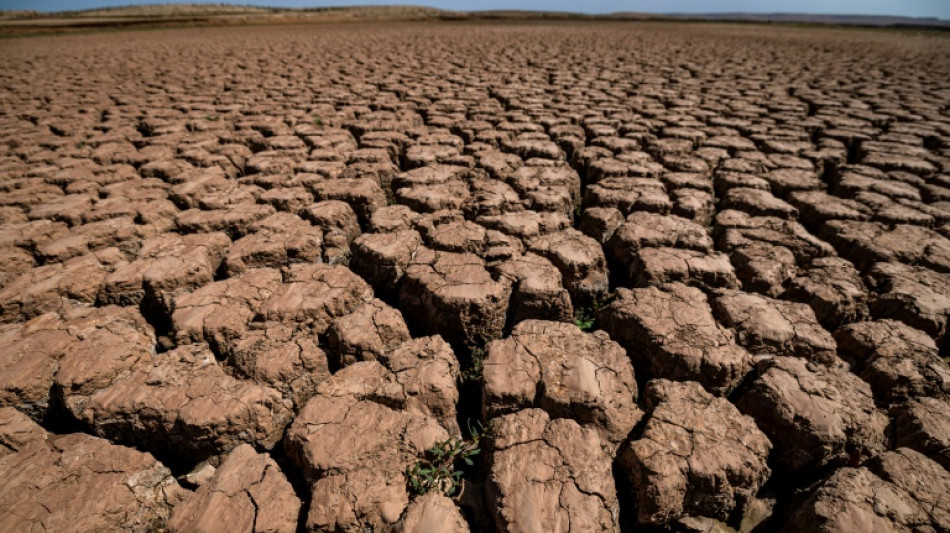
-
 Israeli president says 'we will overcome evil' at Bondi Beach
Israeli president says 'we will overcome evil' at Bondi Beach
-
Munsey leads Scotland to 207-4 against Italy at T20 World Cup

-
 Japan restarts world's biggest nuclear plant again
Japan restarts world's biggest nuclear plant again
-
Bangladesh poll rivals rally on final day of campaign

-
 Third impeachment case filed against Philippine VP Duterte
Third impeachment case filed against Philippine VP Duterte
-
Wallaby winger Nawaqanitawase heads to Japan

-
 Thailand's Anutin rides wave of nationalism to election victory
Thailand's Anutin rides wave of nationalism to election victory
-
Venezuela's Machado says ally kidnapped by armed men after his release

-
 Maye longs for do-over as record Super Bowl bid ends in misery
Maye longs for do-over as record Super Bowl bid ends in misery
-
Seahawks' Walker rushes to Super Bowl MVP honors

-
 Darnold basks in 'special journey' to Super Bowl glory
Darnold basks in 'special journey' to Super Bowl glory
-
Japan's Takaichi may struggle to soothe voters and markets

-
 Seahawks soar to Super Bowl win over Patriots
Seahawks soar to Super Bowl win over Patriots
-
'Want to go home': Indonesian crew abandoned off Africa demand wages

-
 Asian stocks track Wall St rally as Tokyo hits record on Takaichi win
Asian stocks track Wall St rally as Tokyo hits record on Takaichi win
-
Bad Bunny celebrates Puerto Rico in joyous Super Bowl halftime show

-
 Three prominent opposition figures released in Venezuela
Three prominent opposition figures released in Venezuela
-
Israeli president says 'we shall overcome this evil' at Bondi Beach

-
 'Flood' of disinformation ahead of Bangladesh election
'Flood' of disinformation ahead of Bangladesh election
-
Arguments to begin in key US social media addiction trial

-
 Agronomics Limited Announces Net Asset Value Calculation as at 31 December 2025
Agronomics Limited Announces Net Asset Value Calculation as at 31 December 2025
-
UK-Based Vesalic Limited Emerges from Stealth with Landmark Discovery of Potential Non-CNS Driver of Motor Neuron Diseases, including ALS, and Breakthrough Therapeutic and Diagnostic Opportunities

-
 Gotterup tops Matsuyama in playoff to win Phoenix Open
Gotterup tops Matsuyama in playoff to win Phoenix Open
-
New Zealand's Christchurch mosque killer appeals conviction

-
 Leonard's 41 leads Clippers over T-Wolves, Knicks cruise
Leonard's 41 leads Clippers over T-Wolves, Knicks cruise
-
Trump says China's Xi to visit US 'toward the end of the year'

-
 Real Madrid edge Valencia to stay on Barca's tail, Atletico slump
Real Madrid edge Valencia to stay on Barca's tail, Atletico slump
-
Malinin keeps USA golden in Olympic figure skating team event

-
 Lebanon building collapse toll rises to 9: civil defence
Lebanon building collapse toll rises to 9: civil defence
-
Real Madrid keep pressure on Barca with tight win at Valencia

-
 PSG trounce Marseille to move back top of Ligue 1
PSG trounce Marseille to move back top of Ligue 1
-
Hong Kong to sentence media mogul Jimmy Lai in national security trial

-
 Lillard will try to match record with third NBA 3-Point title
Lillard will try to match record with third NBA 3-Point title
-
Vonn breaks leg as crashes out in brutal end to Olympic dream

-
 Malinin enters the fray as Japan lead USA in Olympics team skating
Malinin enters the fray as Japan lead USA in Olympics team skating
-
Thailand's Anutin readies for coalition talks after election win

-
 Fans arrive for Patriots-Seahawks Super Bowl as politics swirl
Fans arrive for Patriots-Seahawks Super Bowl as politics swirl
-
'Send Help' repeats as N.America box office champ

-
 Japan close gap on USA in Winter Olympics team skating event
Japan close gap on USA in Winter Olympics team skating event
-
Liverpool improvement not reflected in results, says Slot

-
 Japan PM Takaichi basks in election triumph
Japan PM Takaichi basks in election triumph
-
Machado's close ally released in Venezuela

-
 Dimarco helps Inter to eight-point lead in Serie A
Dimarco helps Inter to eight-point lead in Serie A
-
Man City 'needed' to beat Liverpool to keep title race alive: Silva

-
 Czech snowboarder Maderova lands shock Olympic parallel giant slalom win
Czech snowboarder Maderova lands shock Olympic parallel giant slalom win
-
Man City fight back to end Anfield hoodoo and reel in Arsenal

-
 Diaz treble helps Bayern crush Hoffenheim and go six clear
Diaz treble helps Bayern crush Hoffenheim and go six clear
-
US astronaut to take her 3-year-old's cuddly rabbit into space

-
 Israeli president to honour Bondi Beach attack victims on Australia visit
Israeli president to honour Bondi Beach attack victims on Australia visit
-
Apologetic Turkish center Sengun replaces Shai as NBA All-Star


Planet 'on the brink', with new heat records likely in 2024: UN
Global temperatures "smashed" heat records last year, as heatwaves stalked oceans and glaciers suffered record ice loss, the United Nations said Tuesday -- warning 2024 was likely to be even hotter.
The annual State of the Climate report by the UN weather and climate agency confirmed preliminary data showing 2023 was by far the hottest year ever recorded.
And last year capped off "the warmest 10-year period on record", the World Meteorological Organization said, with even hotter temperatures expected.
"There is a high probability that 2024 will again break the record of 2023", WMO climate monitoring chief Omar Baddour told reporters.
Reacting to the report, UN chief Antonio Guterres said it showed "a planet on the brink".
"Earth's issuing a distress call," he said in a video message, pointing out that "fossil fuel pollution is sending climate chaos off the charts", and warning that "changes are speeding up".
The WMO said that last year the average near-surface temperature was 1.45 degrees Celsius above pre-industrial levels -- dangerously close to the critical 1.5-degree threshold that countries agreed to avoid passing in the 2015 Paris climate accords.
- 'Red alert' -
"I am now sounding the red alert about the state of the climate," Saulo told reporters, lamenting that "2023 set new records for every single climate indicator".
The organisation said many of the records were "smashed" and that the numbers "gave ominous new significance to the phrase 'off the charts'."
"What we witnessed in 2023, especially with the unprecedented ocean warmth, glacier retreat and Antarctic sea ice loss, is cause for particular concern," Saulo said.
One especially worrying finding was that marine heatwaves gripped nearly a third of the global ocean on an average day last year.
And by the end of 2023, more than 90 percent of the ocean had experienced heatwave conditions at some point during the year, the WMO said.
More frequent and intense marine heatwaves will have "profound negative repercussions for marine ecosystems and coral reefs", it warned.
Meanwhile key glaciers worldwide suffered the largest loss of ice since records began in 1950, "driven by extreme melt in both western North America and Europe".
In Switzerland, where the WMO is based, Alpine glaciers lost 10 percent of their remaining volume in the past two years alone, it said.
The Antarctic sea ice extent was also "by far the lowest on record", WMO said.
- Rising sea levels -
The maximum area at the end of the southern winter was around one million square kilometres below the previous record year -- equivalent to the size of France and Germany combined, according to the report.
Ocean warming and the rapidly melting glaciers and ice sheets drove the sea level last year to its highest point since satellite records began in 1993, WMO said.
The agency highlighted that the global mean sea level rise over the past decade (2014-2023) was more than double the rate in the first decade of satellite records.
The dramatic climate shifts, it said, are taking a heavy toll worldwide, fuelling extreme weather events, flooding and drought, which trigger displacement and drive up biodiversity loss and food insecurity.
"The climate crisis is THE defining challenge that humanity faces and is closely intertwined with the inequality crisis," Saulo said.
- 'Glimmer of hope' -
The WMO did highlight one "glimmer of hope": surging renewable energy generation.
Last year, renewable energy generation capacity -- mainly from solar, wind and hydropower -- increased by nearly 50 percent from 2022, it said.
The report sparked a flood of reactions and calls for urgent action.
"Our only response must be to stop burning fossil fuels so that the damage can be limited," said Martin Siegert, a geosciences professor at the University of Exeter.
Jeffrey Kargel, a senior scientist at the Planetary Science Institute, stressed that the dramatic climae shifts "do not connote the inevitable doom of civilisation".
The outcome, he said, "depends on how people and governments change or don't change behaviours".
Saulo acknowledged that the cost of climate action might seem high.
"But the cost of climate inaction is much higher," she said. "The worst thing would be to do nothing."
Guterres also emphasised that there was still time to "avoid the worst of climate chaos".
"But leaders must step up and act -- now."
J.Williams--AMWN


